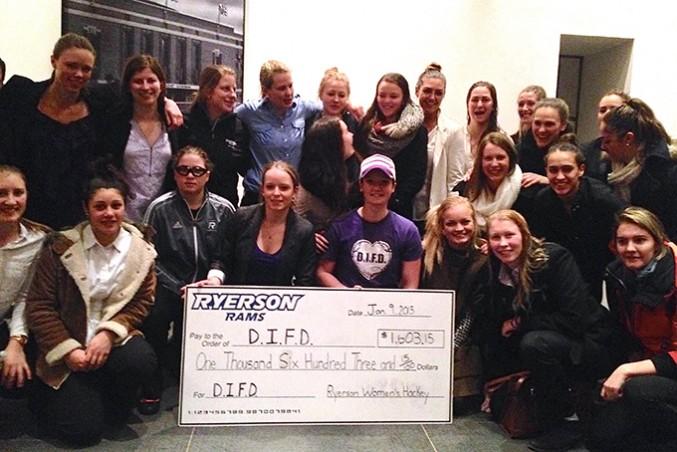By Luke Galati
After a hard-fought game, the Mattamy Athletic Centre’s lights dim. The clean sheet of ice shines, as the focus shifts to the overlooking alumni lounge, the only part of the building still lit.
The room slowly begins to fill with the friends and families of both Ryerson and Queen’s women’s hockey teams. Players and coaches included, the two sides, minutes after a full 60-minute battle, are now united.
The game was a 4-0 loss for the Rams. But while hockey was being played, $1,703.15 was raised for the charity Do It For Daron. DIFD is an organization that was created after the 14-year-old hockey player, Daron Richardson, took her own life. The goal of DIFD is to raise awareness and transform youth mental health; a cause that for the Ryerson team, hits close to home.
Emily Rose Galliani Pecchia – nicknamed Gino – is a fourth-year psychology major. She’s been a Ryerson forward since 2011.
During Gino’s first year of university, she came to school excited. She says that she loved every minute of it. She was so excited about hockey, she would go to bed without sleeping, just thinking about it.
“I would sit in my class, just being so pumped. Literally my thoughts were racing, all the time,” Gino tells the crowd at the post-game reception. “But, then I found after four or five days of not sleeping, and being so happy, I would have two weeks of being in my bed.”
She was stuck, internally fighting herself to wake up in the morning to get to practice. She found herself struggling to do her homework, to go to her classes, to attend her exams. “And, I’d be sitting, trying to do my work, but I couldn’t focus.” The cycle perpetuated, “and suddenly, I realized that I was scared of the thoughts that I was having, and what might happen.”
“and suddenly, I realized that I was scared of the thoughts that I was having, and what might happen.”
Gino felt comfortable enough with Ryerson’s head coach, Lisa Haley, to call her on the phone. “Lisa, I don’t know what’s wrong. I’m having this experience and all this stuff is happening,” she says quickly and erratically.
“Gino, slow down, slow down, slow down, slow down,” says Haley. All of a sudden, Gino becomes, “so embarrassed for calling her, so I said, ‘You know what, I’m going to hang up the phone. I’m so sorry I called, its okay. I’m fine.’”
“You don’t sound fine, I want you to stop, and send an email describing everything that you’ve been experiencing,” Haley says.
“I think that I might have dropped out of university, had she not stopped me in that moment,”
“I think that I might have dropped out of university, had she not stopped me in that moment,” Gino says. Three months later, she started seeing a psychologist. “It’s something that you experience the highs of life and the lows in life in such a rapid succession, it hits you like you can’t even imagine,” she says.
A lot has changed since. Now, Gino says that she has to be hyperaware of what she does in a day. She has to be careful of what she eats, and she can’t socially drink with her friends anymore, because, “this stuff affects me to the point where I can’t get out of bed. Or I’ll be in a situation where I’m not okay, where I can harm myself, or the people around me.”
This causes stress, which in turn leads to panic attacks — an occurrence during past hockey seasons. “In the middle of practice, all of a sudden, the world would just stop. Everything closed in on me, and I couldn’t function as a person.” This led to Gino deciding on her own to take the 2014/2015 season off of varsity hockey.
“I’m not ashamed, or embarrassed, or even upset. I had to say, ‘No, I can’t do this’, and I think too many people push through that, to the point where they hurt themselves,” she says.
Taking a break from lacing her skates up every day with her teammates, “it almost caused another kind of sadness in me,” Gino says in an interview. She says that maintaining her relationships with her friends, being active, and still being around the team has been making the process easier for her.
Gino now supports the Rams, watching her teammates play from the sidelines. But she’s still on the Rams’ official team roster and is working towards making her return next season, in her final year of eligibility.
“The final message here today is have the conversation. Ask them if they’re okay, and be there to support them,”
As Gino finishes telling her story, the crowd rises and gives her a 20 second standing ovation. After a tight embrace from her coach, Gino, the Ryerson and Queen’s hockey teams proudly smile together, holding up the $1,703.15 cheque. The money will help DIFD raise awareness and support others dealing with mental health related issues.
“The final message here today is have the conversation. Ask them if they’re okay, and be there to support them,” Haley says. “Help them find the help, because there are so many great people in the world. And, Gino is a great example of it, taking advantage of the resources available to her. And now she’s starting to thrive again.”
The Olympic gold medal winning coach then says, “That’s what I’m most proud of.”












Leave a Reply